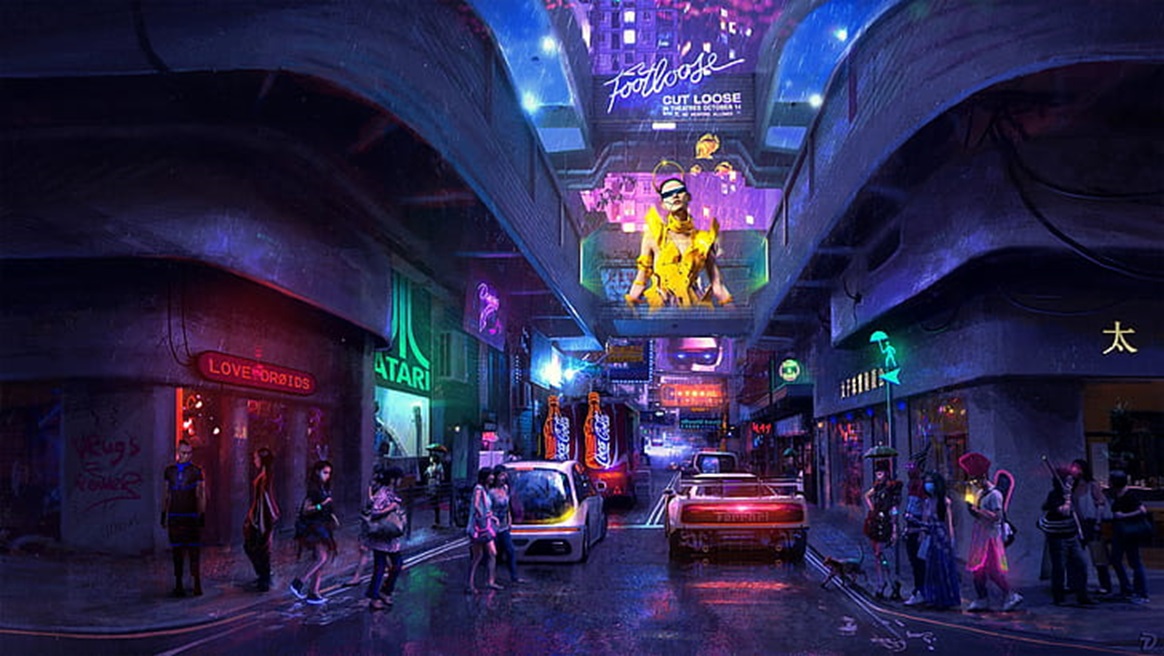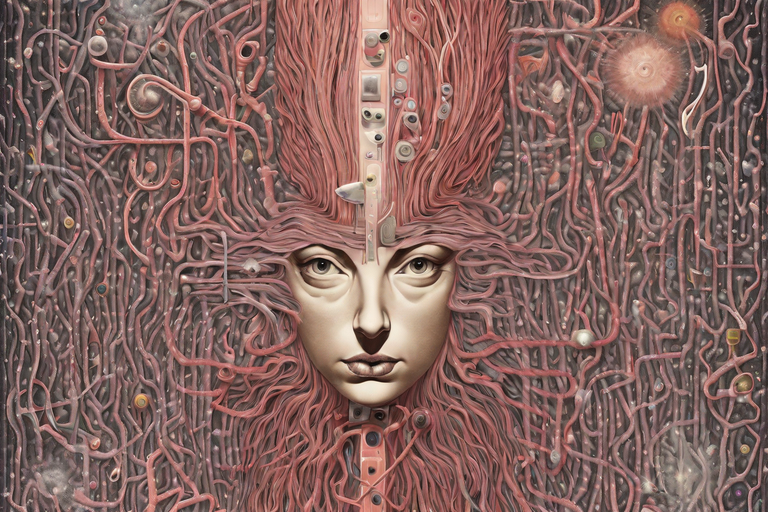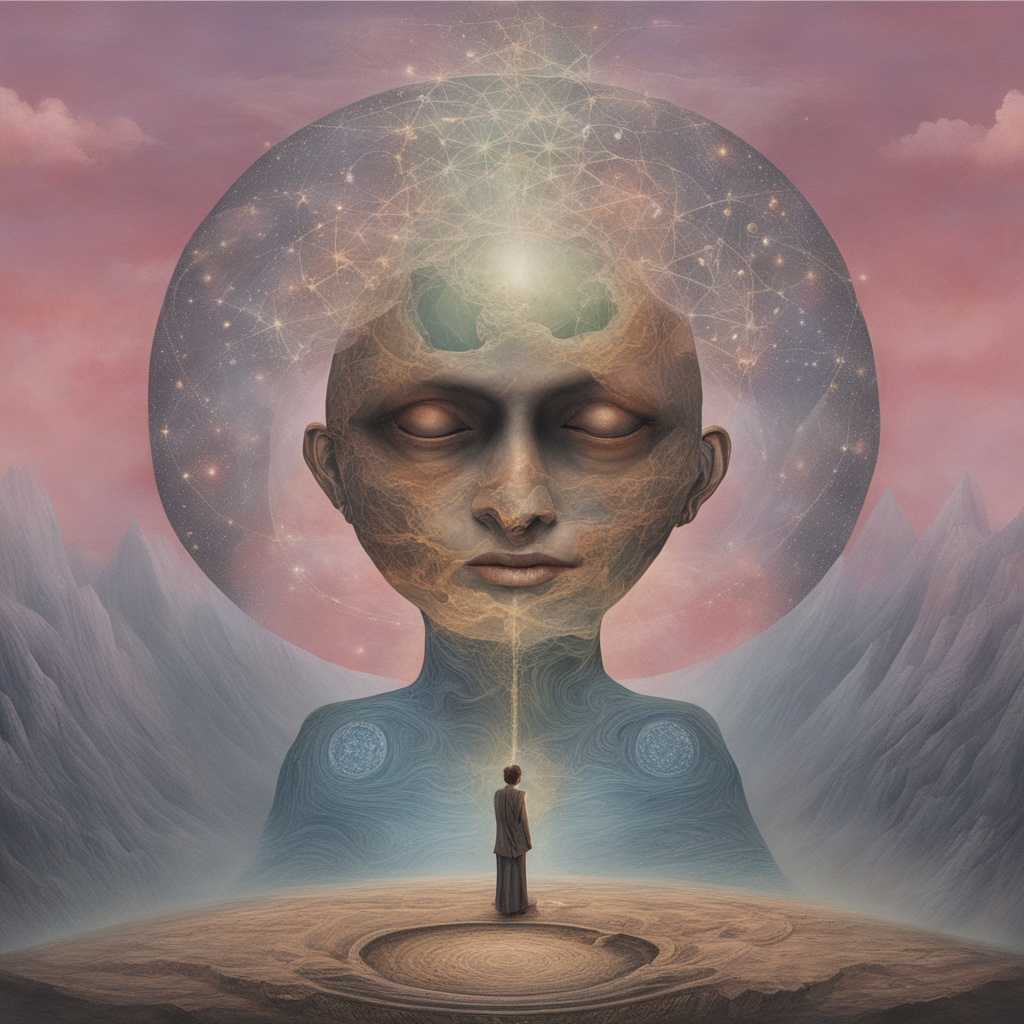The thing about the mechanical life is that we always have to be in the service of some goal or other; the goal has to be there the whole time and it has to be unquestionably important to us – we can’t be half-hearted about it. When our goal or agenda is ‘unquestionably important’ then we don’t have to question it and if we don’t have to question it then we can wholeheartedly orientate ourselves to its completion, its fulfilment, as if this were the very best thing in the whole wide world. We are therefore provided with a form of motivation, we’re provided with a sense of meaning about what we’re doing. In addition, we can make the point that this way we don’t have to question anything – life has been oversimplified down to Doing the Thing, in other words. ‘Doing the Thing’ is the name of the game…
The Mechanical Life can be very easily described by saying that it’s all about ‘performing the allotted function’ therefore, and this means not wondering about why it is so very important for us to perform it. That’s already been decided, that’s already a given – all that is required of us is that we ‘get on with it’! A great responsibility has been lifted from our unwilling shoulders, therefore. All I have to concern myself with is fulfilling the task that is in front of me – everything has already been spelled out for me and so all I need to do is follow the instructions. All I need to do is ‘act the instructions out’. Essentially, I am copying from an unquestionable template and this dependency upon the template (instead of my own intuition) allows me to very effectively sidestep the existential challenge that life brings.
‘The existential challenge that life brings’ might be described in any number of ways, but one way is to say that it’s the challenge to be actually aware – rather than venturing in this direction however we opt to rely upon an External Authority which conveniently tells us ‘everything we need to know’. We’re getting a second-hand version of life here therefore, which carries the benefit (so to speak!) that we don’t have to ‘find out for ourselves’. We can rely totally on the EA and this means that we don’t have to take the risk of being autonomous. Another way of talking about life’s essential challenge would be to say that it equals freedom; no precedents, no rules have been put in place and so we are free to explore for ourselves with absolutely no bias at all anyway in the system. There are no restrictions acting on us.
Rather than avail of this marvellous freedom however we opt for the unfree situation of having all possible ways of thinking about the world ‘mapped out for us’ so that we’re compelled to go down one defined pathway or another; not going down one of these established routes is simply not an option! What we are looking at here is the substitution of the state of compulsivity (or predetermination) for freedom, in other words; the thing about this substitution is that we don’t ever see it; we don’t see it because the starkly uncompromising lack of freedom (which is the compulsive or deterministic state of existence) has been disguised by the trick of ‘replacing radical uncertainty with uncertainty of the trivial variety’. We are being tricked into transferring our attention from the big picture to the small (or trivial) picture; in the words of Douglas Flemons –
The presence of choice (between particularities) at one level masks – and in some sense precludes – choice (between premises) at a more encompassing level.
Within the greater context of <no freedom> we are presented with what we might call a vastly inferior ‘type’ of freedom, which is where we are enabled to choose between alternatives which are only nominally different from each other. It’s because we perceive the nominal difference involved to be somehow ‘more than merely nominal’ that we experience ourselves to be free, that we experience ourselves to be engaged in meaningful activity. In order to experience this manufactured freedom (or manufactured meaning) we need our attention to be constrained within specific limits without there being any awareness of this constraint, therefore. We need to make absolutely sure that [1] we never ‘look out of the box’ and that [2] we ‘never know that we’re even in a box’. We love to talk about this thing called ‘thinking outside the box’ of course but the truth is that we are always at great pains to avoid any such eventuality – we like to talk about it alright, but we never actually do it. The only reason we can live in the box (without knowing that we are) is because we never do venture outside of it. We have precisely zero curiosity about what lies outside the box and this profound lack of curiosity is the box.
To venture outside of ‘the construct that we don’t see to be a construct’ would be to see that we possess zero freedom (i.e., that we are totally determined by an artificial mechanical context) which means that everything we have up to this point known to be true is unceremoniously revealed as being an hallucination, and because we don’t know anything outside of this conditioned world there’s no way for us to relate to the revelation of the truth as being anything other than the Ultimate Catastrophe. This is what consciousness (or increased perspective) will always do – it will always reveal both ourselves and the world we accept as being ‘a final reality’ as being ‘nothing more than hallucinatory content’, as being ‘content in a dream’.
When Alan Watts talks about ‘The taboo against knowing who you are’ he is referring to ‘the taboo against knowing who we are outside of the box that thought has crafted for us’. If we wanted to talk in terms of some sort of generalized conspiracy that exists to prevent us from catching onto the truth, then we could say that ‘the truth’ which we are being prevented from finding out about is that we are living in a box, within a manufactured (or conditioned) reality. Within psychiatry, we sometimes hear this type of belief referred to as The Truman Show Delusion, in honour of the film of the same name. We are quick to categorize beliefs of this nature as an indication of a major mental health condition (namely ‘paranoid psychosis’) and we say that this way of looking at our situation is wholly and completely pathological (since it isn’t true!) – were we to develop more insight ourselves however we would be forced to concede that we are premature in assuming that we know what is going on in mental health conditions such as schizophrenia. We’re engaged in dismissing what is a genuine insight as evidence that the person in question’s brain is malfunctioning in some way, which means that we – as mental health care professionals – are actually ‘gas-lighting our patients in the name of care’. Our allegiance – loathe though we are to hear it – is not the truth but to the continuation of our deeply ingrained cultural assumptions regarding what is real and what is not real.
In general terms, we can say that mechanical society (or ‘the mechanical world that society produces’) represses consciousness; the mechanical world acts in opposition to consciousness because this is the only way because this is the only way it can continue to exist. Instead of consciousness – which cannot be regulated, cannot be controlled, cannot be put in a box – we are provided with an analogue thereof, the analogue which is the System of Thought. Within the System of Thought – as we have just said – the trivial illusion of freedom is maintained within the greater context of control (or determinism) and our perception of ourselves as being actually conscious is a function of this precarious illusion. We only think that we’re conscious because we’re being told that we are; our attention is manipulated from behind the scenes by a bunch of preset rules and the net result of this is that we have the experience of being autonomous, the experience of being self-aware volitional beings. This experience is a ‘produced phenomenon’ however; it is produced by causes and conditions, it’s produced via the action of ‘smoke and mirrors’ and there’s ‘no one actually there’. It is true that there is something there that perceives itself to be an actual independent agent, but this ‘something’ is really just a spook -it’s really nothing more than a hollow manufactured pseudo-entity.
To express this in a simpler way, the mechanical world can only appear to be a world (or appear to be anything at all) when we’re looking at the output of the machine but not at the workings of the machine itself. When we become aware of the workings of the machine then we also become aware of the fact that the output of the machine is the machine and then this machine is a construct – a ‘maintained situation’, an ‘artificial situation that we get trapped in’. In the ordinary run of things, we never come anywhere even close to seeing this. We simply aren’t ever given the leeway to reflect in such a way; we’re kept on a very short leash so that we only ever see what we’re supposed to see – we never ever see the unofficial view, the view that’s not supported by the rules governing the operation of the system. It’s as if we’re looking at a mock-up of a row of houses in a film set – just as long as we’re viewing the buildings from the front the illusion will work perfectly well; walk to either side however and we will be amazed (and quite possibly let down) by how terribly hollow it all is.
To put this even more bluntly, we can say that the mechanical life is where we completely immerse ourselves in ‘Doing the Thing’ and flatly ignore all other considerations. Our ignorance is our strength, so to speak – we absolutely ignore the ‘Why’ (which is ‘the philosophical bit’) and devote ourselves instead to the ‘How’ (which is ‘the purely technical bit’). The mechanical life is the unreflective life, therefore – it is the life where all we’re interested in is ‘following the established rules’ – when we are able to follow the rules or roles (and therefore do what is expected of us) then we are said to be ‘successful’, and when we aren’t then we’re dismayed because we perceive ourselves to have ‘failed’. Winning and losing always have to do with ‘obeying rules’ (or ‘being in Directed Mode’) – these terms have nothing at all to do with living the spontaneous life. There are no rules for spontaneity, needless to say! We are not being ‘spontaneous for a reason’, we’re not being spontaneous because ‘that’s the thing to do’…
The idea that there is this thing called <being successful> (and that being successful is a very good thing, the very best thing of all, in fact) is a huge joke therefore – we are 100% in mechanical mode where our only is concern is ‘how well we are able to obey whatever compulsions that might happen to be acting on us’. We’re so devoted to the cause of ‘acting out the compulsion’ that we actually think we are the compulsion, we actually think that ‘the compulsion is us.’ We have so little autonomy that we imagine ourselves to be the machine that is controlling us – the prisoner believes himself to be the captor, in other words. We have zero autonomy and this is what the state of ‘passive identification’ is all about! The mechanical life is that state of being in which we have zero autonomy and yet in which we deludedly perceive ourselves to be free agents and it is fair to say that the horror of this situation is something that most of us – including the most intelligent, the most erudite of us – simply won’t be able to appreciate. We just ‘won’t get it’, we’ll gloss over the point completely. As machines, we simply cannot perceive how appalling it is to be a machine. As conditioned beings, we simply can’t appreciate what a grotesque caricature of life conditioned existence actually is…
Image – untours.com







Jeffrey H Shampnois
So awareness might be the very thing we set ourselves the task of eliminating, in the name of “becoming aware.” Awareness might be like an irradiating light that ruins the Task, exposes it as a foolish thing to do, without actually “doing” anything other than being aware. Awareness isn’t a new task. Task making is the problem that task making is trying to resolve. But awareness isn’t a task we can perform, it’s just letting the compulsive creature that takes over the mind, letting that animal be alchemically transformed. Wait, or, maybe like this. First, we assume the compulsion is our own compulsion. Then perhaps we realize that the compulsion is like a creature that runs us (the predator’s emissary). Then perhaps we also see something in that creature who is not entirely “an enemy to be eliminated”, not entirely an emissary. The creature is our own severed energy returning to haunt us. And if we don’t engage the thing as an outsider (controller). That means, don’t even mention the “we” as an opposing force of Good. Rather, awareness, which has no center, has no task, alchemically “invites” the compulsive energy back inside the whole of our being. We are alchemically fused with the opposing force, recognizing in our compulsions a kind of desperate message we’ve ignored for ever. That energy could be seen as something trying to make itself known to us. An unresolved or severed perception, something we’ve repressed compulsively, which keeps hounding us. You know, this relentless voice will never shut up until it’s heard with love, and not hatred. It has something to say, and merely listening to it (being aware), without analysis and argument, the message sometimes delivers itself and stops needing to make any more noise. At any rate, the reverberations continue with your essays as always.
zippypinhead1
There is a subtlety to this that completely escapes our normal black and white thinking, that’s for sure. I am reminded me of something M Scott Peck says at the end of The Road Less Traveled about how the avenging furies that won’t ever stop hunting down the instigator of the crime can become transformed into benevolent spirits that pass on wisdom to the one they were persecuting.
“THE ERINYES (Furies) were three goddesses of vengeance and retribution who punished men for crimes against the natural order. They were particularly concerned with homicide, unfilial conduct, offenses against the gods, and perjury. A victim seeking justice could call down the curse of the Erinys upon the criminal. The most powerful of these was the curse of the parent upon the child–for the Erinyes were born of just such a crime, being sprung from the blood of Ouranos (Uranus), when he was castrated by his son Kronos (Cronus).” – https://www.theoi.com/Khthonios/Erinyes.html
Scott Peck is talking about the unforgiving and unrelenting pain of neurosis , which pursues us wherever we go, and – as afar as I remember – he is saying that neurosis has this helpful or beneficial character, which can only be understood at the end of the process.
The Erinyes were born out of the unjust act of Kronos’s castration of his father Uranus, and ever since they have pursued those who commit terrible crimes. The other names for the terrifying implacable Erinyes is ‘the Eumenides’, which translates as ‘The kindly ones’ and Scott Peck argues that this is a reference to their alternative nature as insight-bringers or something like that. As far as I remember…
zippypinhead1
This sounds very similar to what you are saying about ‘severed energy’ returning to us in a scary form.
I wonder if we could look at the Demiurge as severed energy that is somehow serving a greater good?
Jeffrey H Shampnois
I think that’s a very profound and interesting way of looking at it. Could we also say that it’s not merely “how we Look at it,”,but some intelligence within awareness itself that draws that potential into a reality? In other words, the demiurge is already a product of a certain, limited human potential. We have looked at this energy in a particular way, and responded to it in a particular way, and provoked that potential to appear in the world. Massaged it into being. And the world is so open-ended that we seem to discover a magical capacity (slowly and soberly, perhaps even ritualistically) to intelligently draw from the infinite potential (emptiness) new realities. Or maybe that’s not entirely correct either. Maybe the demiurge Does depict a severed energy that we’ve repressed. So it’s reality already created by our response and perception of the world — a response and perception that is essentially repressive, controlling and projective. And the demiurge takes that shape and becomes a reality. And if we respond — or perhaps cease responding in that way, the demiurge is realized (made real) as a lost part of us, the alchemical fusing of a lost limb. What was con-fused, becomes fused, or infused. I could talk about this stuff with you for a long time.